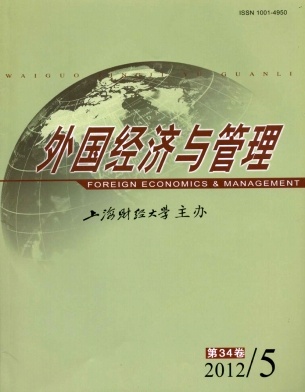企业战略行为研究述评
外国经济与管理 2012 年 第 34 卷第 05 期, 页码:35 - 44
摘要
参考文献
摘要
近年来,企业战略行为研究引起了战略管理学者们的高度关注,显现了战略研究具有的众多悖论和前沿性,对竞争企业之间的战略互动进行了详尽的理论分析,为研究企业的竞争行为提供了有效工具。经济学、管理学、心理学等不同学科背景的学者对企业战略行为进行了大量的研究,并且取得了很多值得关注的成果。本文先依次介绍了经济学解释企业战略行为成因、管理学界定企业战略行为概念和辨析其特点,以及卡内基—梅隆学派以"认知影响战略行为"为研究取向和其他学者基于渐进、交易成本、认知观考察战略决策模式等方面的研究成果,最后对战略行为理论研究的不同视角进行了梳理。
[1]Augier M S and Sarasvathy S D.Integrating cognition,evolution,and design:Extending Simonian perspectives to strategic organiza-tion[J].Strategic Organization,2004,2(2):169-204.
[2]Barnett M L.An attention-based view of real options reason-ing[J].Academy of Management Review,2008,33(3):606-628.
[3]Baron R.The cognitive perspective:A valuable tool of an-swering entrepreneurship’s basic“why”questions[J].Jour-nal of Business Venturing,2004,19(2):221-239.
[4]Besanko D,et al.Economics of strategy[M].(5 th Ed.).New York:Wiley,2009.
[5]Cho T S and Hambrick D C.Attention as the mediator be-tween top management team characteristics and strategic change:The case of airline deregulation[J].Organization Sci-ence,2006,17(4):453-469.
[6]Combs J G and Ketchen D K,Jr.Explaining interfirm cooperation and performance:Toward a reconciliation of predictors from the resource-based view and organizational economics[J].Strate-gic Management Journal,1999,20(9):867-888.
[7]Eggers J P and Kaplan S.Cognition and renewal:Comparing CEO and organizational effects on incumbent adaptation to technical change[J].Organization Science,2009,20(2):461-477.
[8]Fiol C M and O’Connor E J.Waking up!Mindfulness in the face of bandwagons[J].Academy of Management Review,2003,28(1):54-70.
[9]Gavetti G and Levinthal D.Looking forward and looking backward:Cognitive and experiential search[J].Administra-tive Science Quarterly,2000,45(1):113-137.
[10]Gavetti G and Rivkin J W.How strategists really think:Tapping the power of analogy[J].Harvard Business Re-view,2005,83(4):54-63.
[11]Gavetti G.The new psychology of strategic leadership[J].Harvard Business Review,2011,89(7/8):118-125.
[12]Hoffman A J and Ocasio W.Not all events are attended e-qually:Toward a middle-range theory of industry attention to external events[J].Organization Science,2001,12(4):414-434.
[13]Karacapilidis N I,et al.Leveraging organizational knowledge to formulate manufacturing strategy[R].Proceedings of the 11th European Conference on Information Systems,June 2003.
[14]Mintzberg H and JLampel J.Reflecting on the strategy process[J].Sloan Management Review,1999,40(3):21-30.
[15]Nadkarni S and Barr P.Industry context,managerial cogni-tion,and strategic actions:An integrated view[J].Strategic Management Journal,2008,29(13):1395-1427.
[16]Porter M E.The five competitive forces that shape strategy[J].Harvard Business Review,2008,86(1/2):78-93.
[17]Shane S.Prior knowledge and the discovery of entrepreneur-ial opportunities[J].Organization Science,2000,11(4):448-469.
[18]Sigrist B.Entrepreneurial opportunity recognition[R].A presentation at the Annual UIC/AMA symposium at.Mar-keting/Entrepreneurship Interface,Sofia-Antipolis,France,1999.
[19]Tripsas M and Gavetti G.Capabilities,cognition and inertia:Evidence from digital imaging[J].Strategic Management Journal,2000,21(10/11):1147-1161.
[2]Barnett M L.An attention-based view of real options reason-ing[J].Academy of Management Review,2008,33(3):606-628.
[3]Baron R.The cognitive perspective:A valuable tool of an-swering entrepreneurship’s basic“why”questions[J].Jour-nal of Business Venturing,2004,19(2):221-239.
[4]Besanko D,et al.Economics of strategy[M].(5 th Ed.).New York:Wiley,2009.
[5]Cho T S and Hambrick D C.Attention as the mediator be-tween top management team characteristics and strategic change:The case of airline deregulation[J].Organization Sci-ence,2006,17(4):453-469.
[6]Combs J G and Ketchen D K,Jr.Explaining interfirm cooperation and performance:Toward a reconciliation of predictors from the resource-based view and organizational economics[J].Strate-gic Management Journal,1999,20(9):867-888.
[7]Eggers J P and Kaplan S.Cognition and renewal:Comparing CEO and organizational effects on incumbent adaptation to technical change[J].Organization Science,2009,20(2):461-477.
[8]Fiol C M and O’Connor E J.Waking up!Mindfulness in the face of bandwagons[J].Academy of Management Review,2003,28(1):54-70.
[9]Gavetti G and Levinthal D.Looking forward and looking backward:Cognitive and experiential search[J].Administra-tive Science Quarterly,2000,45(1):113-137.
[10]Gavetti G and Rivkin J W.How strategists really think:Tapping the power of analogy[J].Harvard Business Re-view,2005,83(4):54-63.
[11]Gavetti G.The new psychology of strategic leadership[J].Harvard Business Review,2011,89(7/8):118-125.
[12]Hoffman A J and Ocasio W.Not all events are attended e-qually:Toward a middle-range theory of industry attention to external events[J].Organization Science,2001,12(4):414-434.
[13]Karacapilidis N I,et al.Leveraging organizational knowledge to formulate manufacturing strategy[R].Proceedings of the 11th European Conference on Information Systems,June 2003.
[14]Mintzberg H and JLampel J.Reflecting on the strategy process[J].Sloan Management Review,1999,40(3):21-30.
[15]Nadkarni S and Barr P.Industry context,managerial cogni-tion,and strategic actions:An integrated view[J].Strategic Management Journal,2008,29(13):1395-1427.
[16]Porter M E.The five competitive forces that shape strategy[J].Harvard Business Review,2008,86(1/2):78-93.
[17]Shane S.Prior knowledge and the discovery of entrepreneur-ial opportunities[J].Organization Science,2000,11(4):448-469.
[18]Sigrist B.Entrepreneurial opportunity recognition[R].A presentation at the Annual UIC/AMA symposium at.Mar-keting/Entrepreneurship Interface,Sofia-Antipolis,France,1999.
[19]Tripsas M and Gavetti G.Capabilities,cognition and inertia:Evidence from digital imaging[J].Strategic Management Journal,2000,21(10/11):1147-1161.
引用本文
罗珉. 企业战略行为研究述评[J]. 外国经济与管理, 2012, 34(5): 35–44.
导出参考文献,格式为:
上一篇:创业社会化研究前沿探析与未来展望
下一篇:红桃皇后竞争理论研究综述与展望





 7728
7728  725
725

